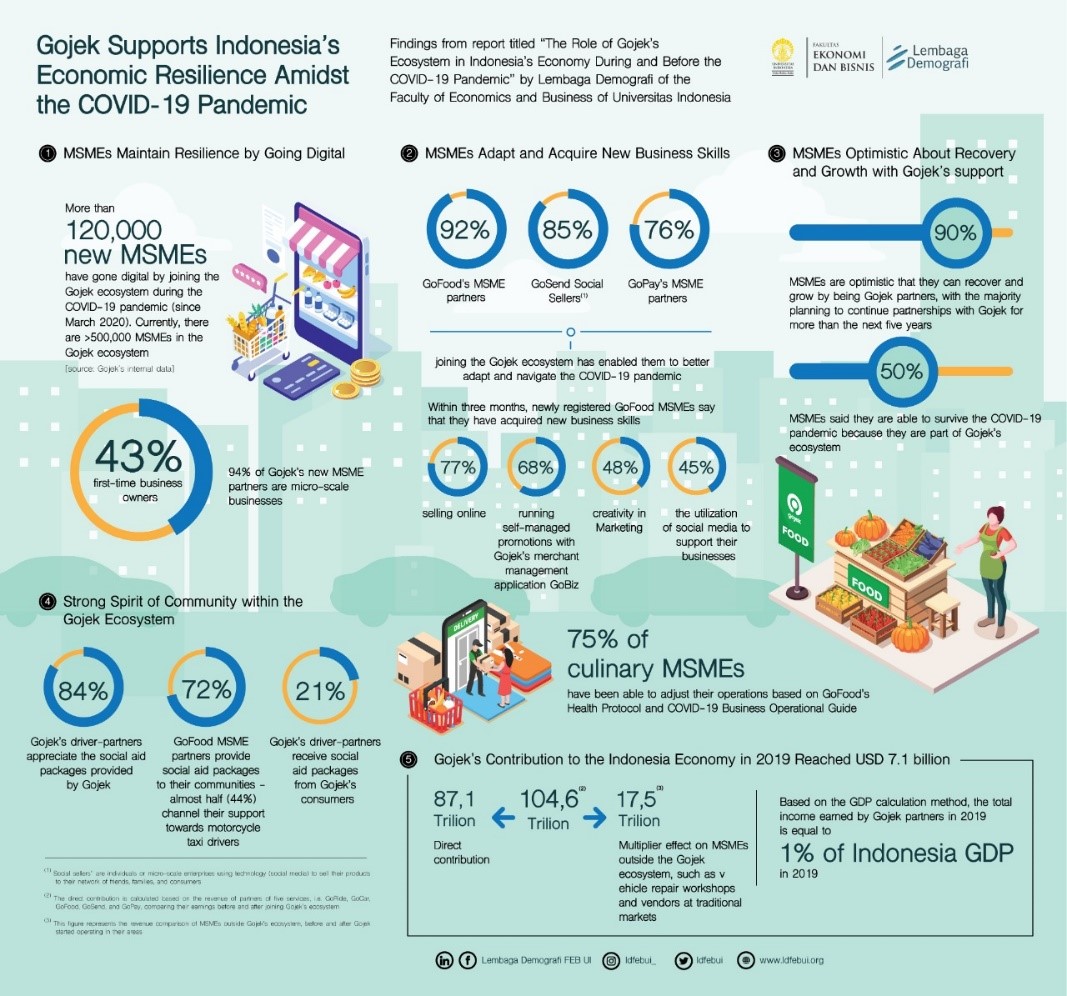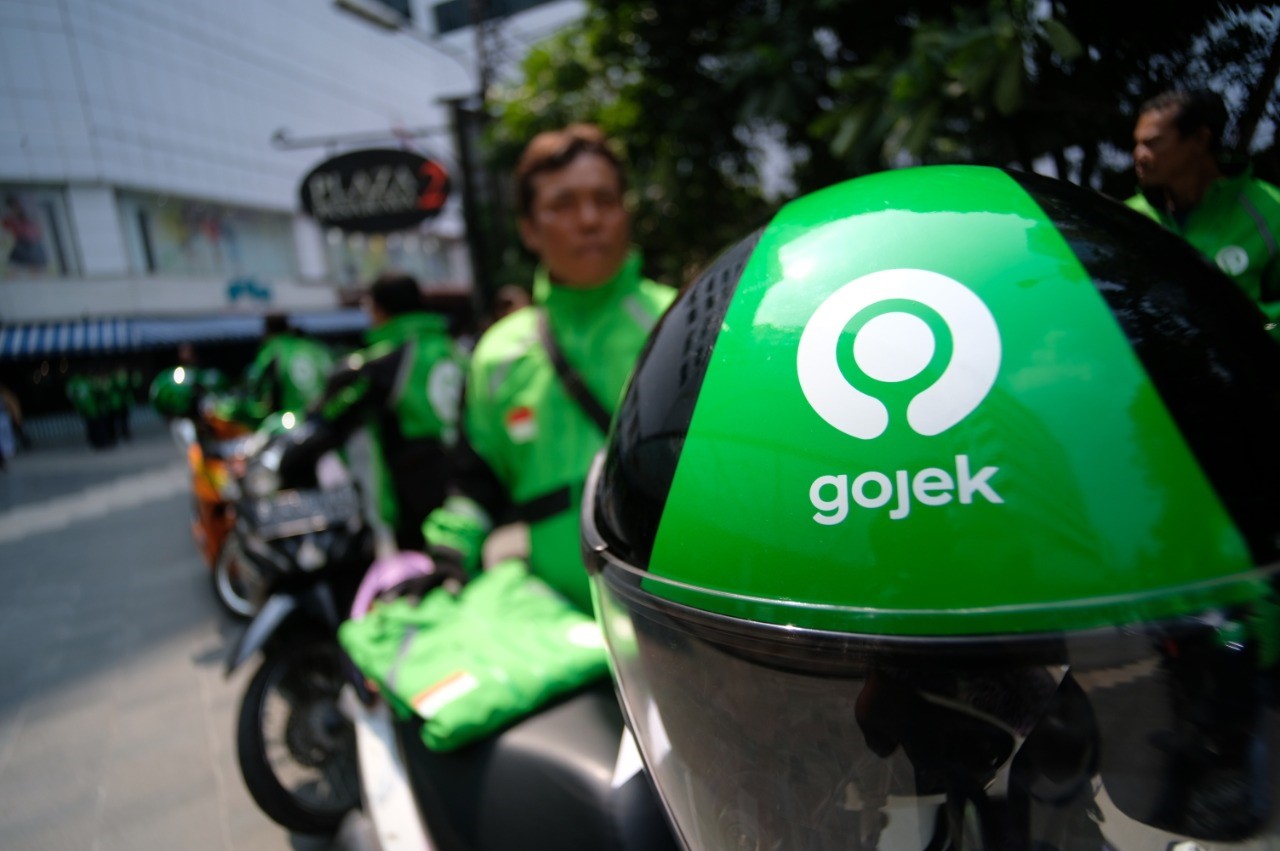The use of the internet and technology in general has grown exponentially in the past few months, particularly for micro, small and medium enterprises (MSMEs). As consumer behavior changes, the use of digital platforms to operate businesses has become the new standard for these entrepreneurs.
Beyond enabling remote work, digital platforms are helping those who have lost their jobs due to the COVID-19 pandemic pivot and become first-time entrepreneurs. More and more people are creating own home-based businesses, marketing their products or services through social media and connecting with suppliers and consumers from the comfort and safety of their own space.
A recent survey from Mandiri Institute found that an online presence helps MSMEs be more resilient and sustain their businesses; as 42 percent of offline MSMEs have stopped operating, compared to 24 percent of online MSMEs in the survey.
The survey also found that digitalized MSMEs can help Indonesia reduce 1.5 percent of the economic burden on its GDP caused by the ongoing pandemic. This rate is significant given that Indonesia’s economy is expected to grow by a mere 2.3 percent in 2020, the lowest in 21 years, or contract by 0.4 percent under the worst-case scenario, according to government estimates.
Digital platforms, once seen as complementary tools for small businesses, have become essential to keeping them afloat. The pandemic has forced an accelerated digital transformation for many MSMEs, as well as creating demand for new products like frozen or ready-to-cook meals and innovative hygiene products.
Such a fast-paced digital transformation has largely been driven by on-demand digital platforms like Gojek. The leading super-app has always been focused on creating inclusive growth by embracing micro businesses that make up the overwhelming majority of Indonesia’s businesses.
On Monday, Aug. 3, 2020, the University of Indonesia’s Faculty of Economics and Business Demographic Institute (LD FEB UI) released a study showing Gojek’s positive impact on its partners' livelihood and the economy before and during the COVID-19 pandemic.
The study revealed that Gojek contributed Rp 104.6 trillion (US$ 7.2 billion) to the Indonesian economy in 2019 prior to COVID-19 pandemic hit. This comprises a direct contribution of Rp 87.1 trillion and a positive multiplier effect of Rp 17.5 trillion in the informal sectors most immediate to its ecosystem, such as auto-shops used by driver partners and food produce sellers (wet market sellers) whose goods are procured by GoFood partners for raw ingredients. The researchers further calculated that the total production value created by Gojek partners surveyed is equivalent to 1 percent of Indonesia’s GDP.
Alfindra Primaldhi, a researcher at LD FEB UI, said the study showed the importance of business digitization and offline-to-online migration in reducing the adverse effects of economic slowdown.
“Conducted in two different time frames (before and during the pandemic), the study reveals how the digital ecosystem and the range of assistance and innovation offered by Gojek continues to expand income opportunities for Indonesian SMEs and private sector workers who were affected by the pandemic, but had no prior business experience. This is where we see Gojek’s important role in creating economic opportunities. There are many first-time business owners because Gojek provides a very low entry barrier for people to be an entrepreneur,” said Alfindra.
Gojek’s online food delivery service, GoFood, was reported to act as an economic buffer for those whose income is affected by the pandemic, especially employees in the private sector. In fact, 40 percent of GoFood partners in the survey had only joined the ecosystem during the pandemic (since March 2020). Among these partners, 94 percent are micro sale entrepreneurs and 43 percent are first-time entrepreneurs.

By being in the Gojek ecosystem, MSMEs consider themselves able to adapt amid the pandemic, thanks to the platform’s digital infrastructure, tech as well as non-tech solutions. This was shown by 92 percent of GoFood MSME partners, 97 percent of GoSend MSME social seller partners and 89 percent of GoPay MSME partners from the study.
These MSME partners consider technological and non-technological solutions from Gojek to help them survive and sustain their businesses. GoFood MSME partners benefit from the technology features of self-managed promotion arrangements on GoBiz - Gojek’s merchant-facing app (68 percent) and the promotion period (51 percent). Meanwhile, social partners for MSME social sellers who use GoSend benefit from GoSend services in the city (77 percent) and intercity GoSend services (32 percent). Meanwhile, GoPay MSME partners benefit from the noncash payment receipt feature (75 percent) and the GoBiz application (49 percent).
In less than three months, culinary and non-culinary MSMEs that have just joined the Gojek ecosystem gained new skills, namely online selling skills (77 percent), the use of social media for business (48 percent) and creativity in marketing (45 percent).
These findings were echoed during an interview with two MSME partners in Gojek’s ecosystem, namely Bagas, the owner of Susu Sedunia Fatmawati in Semarang; and Deni, the owner of RM Padang Andi Mulya in Bandung.
Bagas, who joined GoFood in May 2019, stated that 60 percent of his sales were driven by GoFood and that he utilized the platform’s promotional features to recover during times of decreasing orders.
“GoFood really helps my business. Although the business is affected by the pandemic, I don’t give up, and I stay optimistic because of GoFood. I am very thankful for GoFood’s support for MSMEs, as it helps us survive and increase sales,” said Bagas.
Meanwhile, Deni truly felt the benefits of GoFood as his business was struggling due to the pandemic. His revenue has dropped 20 to 30 percent, mainly due to closing his restaurant for dine-ins. While operating solely through GoFood for the past few months, Deni noticed how consumers are seeking less expensive food, which he adapted to.
“[…] So, I offered all promotions available through GoFood to attract consumers and generate more orders. It is proven that with Gojek’s platform, I get the assistance I need during this pandemic, to be able to keep the business afloat and pay my employees’ salary,” said Deni.
According to the research, 90 percent of MSME partners surveyed feel optimistic about their business recovery and growth by continuing as Gojek partners, with the majority planning to continue with Gojek at least in the next five years.
Navigating through the pandemic and beyond, MSMEs must get accustomed to digital platforms. With business enablers such as Gojek, MSMEs are able to stay resilient, adapt and grow in an increasingly digital world.







